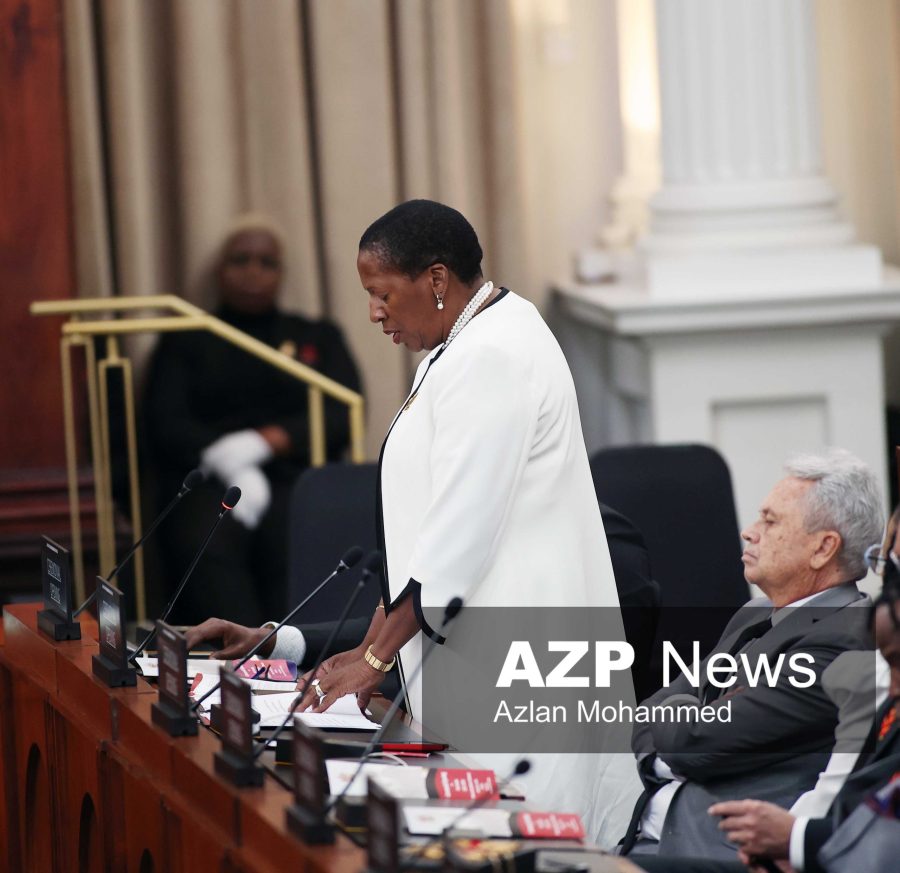Caption: Opposition Leader Pennelope Beckles
By Sue-Ann Wayow
THE People’s National Movement (PNM) Opposition will not support a total elimination of the demerit point system, a system that the PNM government had put in place.
Opposition Leader Pennelope Beckles said on Tuesday that while it will not support a total discard, the Opposition was willing to entertain a review of the system.
Beckles was speaking during a press conference held at the Office of the Leader of the Opposition, one day after she was the sole nominee for the post of political leader in the PNM’s upcoming internal election.
Beckles said, “Road safety is a matter of life and death. While no one enjoys being ticketed, the system can save lives and promote discipline. The Opposition would not support a total elimination of the Demerit Point System, especially with no alternative to date, but of course we would be willing to entertain a review.”
She also urged the Trinidad and Tobago Police Service (TTPS) to continue to encourage drivers to exercise caution on the nation’s roads adding that the PNM stands in solidarity with agencies such as Arrive Alive, and other like-minded agencies.
Beckles also said, “It is our belief that enhancing the visibility of patrols and regular check points by the Ministry of Homeland Security and the TTPS especially as we aware that in the hurricane and rainy season will further bolster safety measures on our roads.”
Member of Parliament for Arouca/Lopinot Marvin Gonzales further expounded on the issue saying the demerit point system did not happen overnight.
He said before 2010, the PNM government was under a lot of public pressure to initiate road safety initiatives as Trinidad and Tobago was recording some 250 plus road fatalities annually.
Leading that charge was Arrive Alive who met with the then Ministry of Works and Transport and brought proposals to enhance road safety, Gonzales said as he was a technocrat at the ministry at that point.
Apart from deaths and families losing loved ones, victims in such accidents were either not able to physically work again and became dependent on state’s assistance, he said.
As a result, Gonzales said several legislations were introduced including laws for driving under the influence, seatbelt wearing, use of mobile phones while driving and the use of speed detection devices were initialised as well as the demerit point system stating that they were implemented over a period of approximately a decade.
He said, “As a result, as they were being introduced on an incremental basis, we witnessed, an incremental decline in road fatalities in Trinidad and Tobago to the extent that by 2020 and 2021 when all of these initiatives were introduced, Trinidad and Tobago being the only country in the world… recorded a 60 per cent decline in road fatalities.”
Gonzales also said that was the first time since 1956 that the country recorded a road fatality rate of under 100.
“We saw drivers changing their behaviour and as they change their behaviour our roads were safer to drive,” he said.
Defending the demerit point system, Gonzales said it was a system to track a driver’s road behaviour and it was “staggering” that some drivers were able to accumulate over 200 demerit points.
He said citizens needed to ask themselves how they feel as citizens driving on the nation’s roads contending with persons who have accumulated hundreds of demerit points due to poor driving habits.
Gonzales said, “We do not have any perfect system but we can identify ways in which we can improve the system.”
Scrapping the demerit point system was a campaign promise by the United National Congress (UNC) fulfilled by Prime Minister Kamla Persad-Bissessar.
It was one of the first moves announced in her first post Cabinet meeting.
However, several persons are against the complete scrapping of the system including Arrive Alive and President Christine Kangaloo.
Kangaloo made an appeal to government to ensure that measures were in place to enhance road safety at the ceremonial opening of Parliament on May 23.
Last week, Persad-Bissessar maintained her stance on the system saying there has been no evidence that it assisted in reducing road traffic accidents.
![]()














